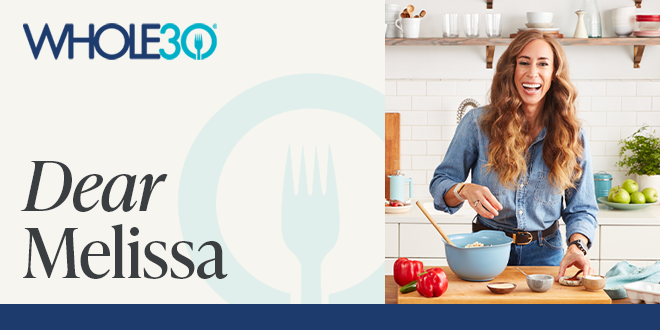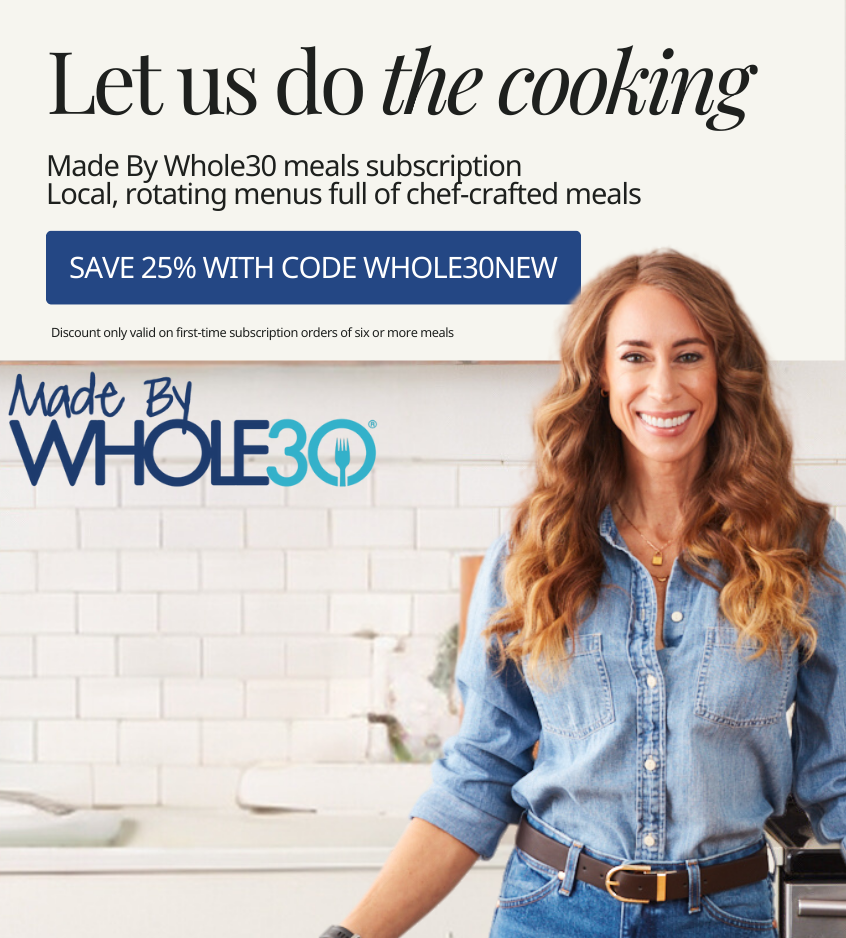Dear Melissa,
I just finished my January Whole30, and I feel amazing! I have more energy, my skin is glowing, I’m no longer bloated all the time, and I ran my fastest 5K time ever this weekend. Now that I’m approaching my food freedom, I’m thinking about how to deal with stress. During elimination, it was easy to avoid reaching for chocolate or wine during a stressful moment. My Whole30 helped me develop new coping skills, but I’d love to hear your favorite ways to navigate stress, discomfort, and negative emotions that don’t involve food or alcohol.–Christina, Baton Rouge, LA
Dear Christina,
The Whole30 doesn’t just change your health and relationship with food, it’s specifically designed to change your habits. During your Whole30, you learned that there are more helpful ways to handle stress, anxiety, boredom, loneliness, and anger than automatically reaching for something sweet, crunchy, salty, and fatty. While there is a place as food for comfort in your food freedom—food can be inherently comforting, and there is nothing wrong with conscientiously using food in that manner—I don’t want food or alcohol to be your only tool for dealing with stress.
Why we automatically reach for food
Using food as our primary—or sometimes only—coping mechanism is learned behavior, modeled by our parents and other adults as we were growing up; and advertised to us on television, in magazines, and on billboards. It’s also socially acceptable (encouraged, even) to reach for food when we’re feeling down, anxious, or upset. (Think of all the marketing encouraging moms to cope with a glass of wine after a hard day, or women to comfort themselves after a break-up with a pint of ice cream.) And if we’re all doing it, nobody has to question whether or not it’s in our best interest, which makes it even more normalized.
Coping with food or drink is also so prevalent because it’s easy. The foods we crave during stress or discomfort are often cheap, readily available, and designed to make you crave and over-consume them. The candy, chips, fries, donuts, cookies, and chocolate are nutrient-poor and hyper-palatable; perpetuating the deeply ingrained habit cycle of stress -> crave -> over-consume (which leads to more stress, cravings, and over-consumption).
No wonder the habit of reaching for food or drink as comfort is so hard to break—we’ve been modeled this coping mechanism our whole lives, it’s been marketed to us as both helpful and normal, and it’s far easier than sitting with our discomfort and examining what’s underneath it.
Food can be love
I don’t believe using food as comfort, self-love, or to self-soothe is “bad,” nor do I believe we should never use food in that manner. I still seek specific foods I love, like salt and vinegar potato chips, cashew-milk ice cream, or a cheeseburger and fries, when I’m feeling down, anxious, or just need an afternoon of self-care. (Yes, I still use food as self-care, and yes, I feel fantastic about that!)
However, it can be problematic when food is your only source of comfort, self-love, or self-soothing; or if you use food to automatically numb, distract, or distance yourself from your feelings and needs. If you can’t sit with the discomfort of negative emotions and fail to create other strategies for exploring how you feel, relieving stress, and showing yourself care, your habits and emotional relationship with food can spiral into a place that doesn’t feel good mentally or physically.
Most people come to the Whole30 with the intention of changing their habits and relationship with food. The program is designed to help you do just that, using the science of an elimination diet and a foundation of habit and behavior-change research. You mentioned that you’ve already learned new tools during your program, which is awesome! Now that reintroduction is over, I want you to continue to learn, create, and explore other strategies for for how to deal with stress. Ideally, food then becomes just one of those tools in a broad, colorful, diverse tapestry of skills, plans, and strategies you’ve developed to handle stressful situations.
So what else can you do in the face of stress, anxiety, frustration, and anger? There are a number of answers and your solutions will be unique to you, but in my experience, they all have one underlying theme in common … connection.
Cookie vs. connection
When I am feeling overwhelmed, down, and alone—disconnected from myself, my friends and family, my emotions, or my environment—it’s easy for me to isolate. And being alone in my space and feelings makes it all too easy to slip into habits and mindsets that don’t serve me. What I’m usually looking for in moments of discomfort, stress, or anxiety is to connect, acknowledge what I’m feeling, and move forward in a healthy way.
The first step in how to deal with stress, anxiety, or anger is to identify what kind of connection you need, and gift that to yourself. Some examples:
- I’m way angrier about this than I should be. I need to calm down and give myself some space to explore what’s underneath this. I’m going to rage-clean until I feel more calm/go for a long walk/take a hot bath. (Connecting with yourself.)
- This objectively sucks, so I need to be extra-nice to me right now, because I deserve that grace. I’m going to put on some good music and prep a nourishing meal/buy myself flowers/put my phone away for the night and read a good book. (Connecting with yourself.)
- This feels overwhelming. I need someone to help me break it down into bite-sized pieces and lend me some support. I’ll call/ visit/ text my friend/ mom/ partner/ therapist. (Connecting with others.)
- I’m still feeling down and can’t snap myself out of it. I’ll join a friend for yoga/ask my spouse to go for a walk/call my sister and ask to vent/meet my coworkers for happy hour—sparkling water and lime, please! (Connecting with others.)
- I’m so frustrated and angry, and I need an outlet to express that. I’m going to the gym/hitting the trail for a run/going out to take some photos/spending the next 15 minutes free-journaling. (Connecting with your emotions.)
- I’m feeling some big stuff and I don’t know where it’s coming from. I’m going to meditate/check in with my body from a place of curiosity not judgment/ask my spirit guides/ the universe/ God for help. (Connecting with your emotions.)
How to connect
I learned during my first Whole30 that talking to someone about the situation and how I’m feeling is always my first go-to. Saying things out loud seems to put them in perspective. In my head, it can feel SO big and overwhelming, but when I say it out loud, those uncomfortable, shameful, or anxious thoughts often lose some (or most) of their power.
Also, you deserve to feel supported and know that you’re not alone. Your conversation partner may be able to actually help with practical advice or assistance, but at the very least, they will show you empathy, listen to your feelings, or just give you a hug and tell you that they’re here for you, which can shift your energy out of feeling overwhelmed and back into empowered. In-person social interactions can be a huge modulator of stress, so if you have the option of grabbing coffee, going for a walk, or meeting during a work break, choose that over a phone call or text message (although those can help too). To level up your mental health even more, spend time moving your body and/or getting outdoors, letting those green spaces, sunshine, and endorphins that can come with movement boost your mood too.
Therapy is also hugely helpful here. A trained therapist can help you untangle your feelings or unpack what’s underneath them. Online support groups or forums, subscriber-only communities (that feel safer than general social media spaces), or in-person meetups can also provide guidance, support, and encouragement around specific issues or life circumstances.
Finally, there are solo practices that can help you feel more connected to your body, emotions, needs, and higher power (whether that’s God, the Universe, or your best self). Free guided meditations can help you get in touch with your feelings somatically, walk you through reparenting exercises, or project loving kindness to yourself and others. Journaling is another great practice, whether you write a letter that never gets sent, follow prompts from a therapist or self-help book, or simply free-write how you’re feeling in the moment. Remember that understanding how to deal with stress on your own terms, and discovering the connections you need, can be empowering for your overall well-being.
Healthy habits that last a lifetime
As you continue to work your Food Freedom plan, you’re going to encounter situations that leave you feeling anxious, lonely, stressed, or angry. Leaning on what you’ve learned from your Whole30 experience, actively committing to your Food Freedom plan, and continuing to practice other ways to comfort, love, reward, and support yourself will help you create new, healthy habits that last a lifetime. Food can be a part of that toolbox, but I encourage you to actively fill that box with a variety of other strategies too.
Best in health,
Melissa















